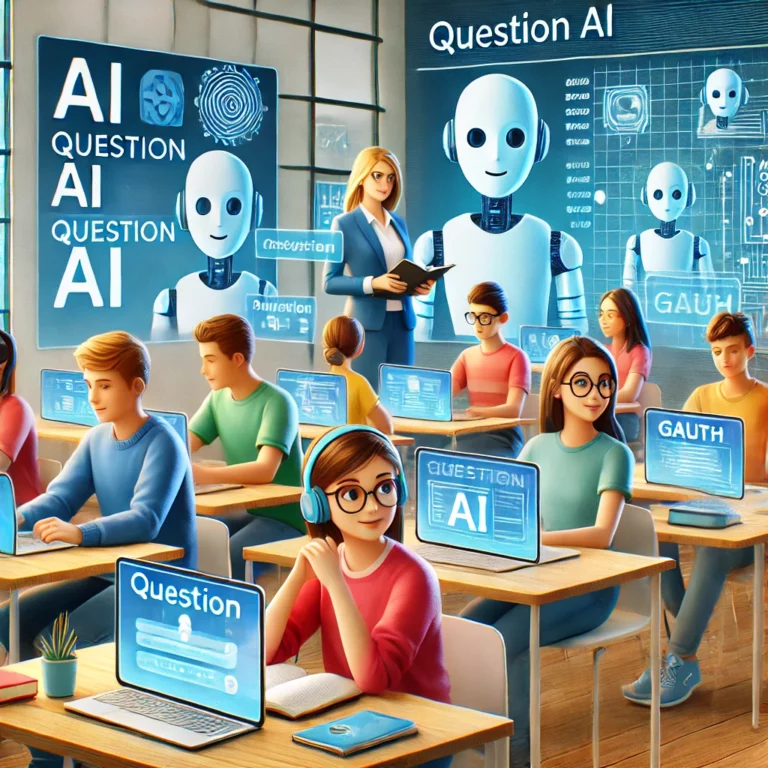Introduction
AI tutors are changing how kids study in the US, with leading apps from China. The integration of artificial intelligence into educational systems has significantly transformed traditional learning methods, providing students with personalized, accessible, and affordable tutoring options. As technology continues to advance, AI tutors are becoming more prevalent, challenging established tutoring franchises and reshaping the educational landscape.
In this blog post, we will explore the impact of AI tutors on education in the US, the rise of Chinese-owned educational apps, and the challenges and opportunities associated with this technological shift. We will delve into the benefits of personalized teaching, the equity and affordability of AI-driven tutoring, and the potential pitfalls of relying on AI for educational support. Drawing on scientific insights and expert opinions, we aim to provide a comprehensive overview of this emerging trend.
The Transformation of Tutoring: AI vs. Traditional Methods
The Emergence of AI Tutors
AI bots are posing a threat to traditional tutoring franchises like Kumon. Traditional tutoring methods have long been the cornerstone of after-school education, with franchises like Kumon providing structured, consistent support to students. However, the rise of AI tutors is disrupting this model by offering a more flexible and tailored approach to learning. AI tutors can adapt to each student’s unique learning pace, providing personalized feedback and guidance that traditional methods often lack.
According to TechCrunch, AI tutors make after-school tutoring more equitable and affordable. Unlike conventional tutoring, which can be costly and inaccessible for many families, AI-powered educational apps offer an affordable alternative. These apps provide high-quality tutoring at a fraction of the cost, democratizing access to educational support and helping bridge the gap for students from diverse socioeconomic backgrounds.
Personalized Teaching and Learning Habits
AI enables personalized teaching and can remember a student’s learning habits. One of the most significant advantages of AI tutors is their ability to tailor lessons to individual students. By analyzing a student’s progress and learning patterns, AI tutors can adjust their teaching strategies to meet the student’s specific needs. This personalized approach helps students grasp difficult concepts more effectively and fosters a deeper understanding of the material.
Furthermore, AI tutors are mostly text-based but will soon be able to speak to students. The advancement of generative AI and voice response technology is set to revolutionize the way students interact with AI tutors. Soon, students will be able to engage in verbal communication with their AI tutors, making the learning experience more interactive and engaging.
The Influence of Chinese Educational Apps
Chinese Dominance in the US Market
Chinese-owned AI helpers like Question AI and Gauth are popular in the US. These apps have gained significant traction due to their advanced technology and user-friendly interfaces. Chinese developers have been at the forefront of AI innovation, creating highly effective educational tools that cater to the needs of students worldwide. The popularity of these apps in the US highlights the global reach and influence of Chinese technology in the educational sector.
Chinese homework apps target the American market due to China’s regulations. Stringent educational regulations in China have prompted many Chinese tech companies to expand their reach to international markets, including the US. This expansion has introduced American students to a new wave of advanced educational tools, enhancing their learning experiences and providing them with access to high-quality tutoring resources.
Challenges and Opportunities
AI study apps struggle to differentiate solely on the quality of answers. While AI tutors offer many advantages, they face challenges in standing out in a crowded market. Providing accurate answers is essential, but it is not enough to ensure long-term success. To differentiate themselves, AI study apps must focus on delivering comprehensive learning experiences that include interactive elements, personalized feedback, and engaging content.
Educators are unsure how to handle AI in schools, with some banning access. The integration of AI in education has sparked debate among educators. Some view AI as a valuable tool that can enhance learning, while others are concerned about its potential drawbacks. Issues such as data privacy, the accuracy of AI-generated content, and the risk of over-reliance on technology have led some schools to restrict access to AI tutors. Finding a balanced approach that leverages the benefits of AI while addressing these concerns is crucial for the future of education.
The Benefits of AI in Education
Equitable and Affordable Learning
AI tutors make after-school tutoring more equitable and affordable. By offering cost-effective solutions, AI tutors help level the playing field for students from various backgrounds. This accessibility ensures that more students can benefit from high-quality educational support, regardless of their financial situation.
Moreover, the scalability of AI tutors allows them to reach a larger number of students simultaneously. Unlike traditional tutors, who can only work with a limited number of students at a time, AI tutors can provide assistance to countless students, making education more inclusive and widespread.
Personalized Instruction and Engagement
Personalized teaching is a hallmark of AI tutors, enabling them to cater to each student’s unique needs. This personalized approach not only improves learning outcomes but also enhances student engagement. When students receive tailored instruction that aligns with their learning styles, they are more likely to stay motivated and invested in their studies.
The ability of AI tutors to remember learning habits and adjust their teaching methods accordingly further enhances the effectiveness of personalized instruction. This adaptability ensures that students receive the support they need to succeed, regardless of their individual learning challenges.
The Future of AI in Education
The Evolution of AI Tutors
AI tutors are evolving rapidly, with new features and capabilities being developed continuously. The transition from text-based to voice-enabled AI tutors is just one example of how technology is advancing to create more interactive and engaging learning experiences. As AI technology continues to improve, we can expect even more sophisticated educational tools that will further transform the way students learn.
Generative AI, which can create personalized content and simulations, is also poised to play a significant role in the future of education. This technology can provide students with immersive learning experiences that go beyond traditional textbooks and lectures, making education more dynamic and interactive.
Addressing Challenges and Ensuring Quality
AI is seen as an imperfect assistant that can sometimes make mistakes. While AI tutors offer many benefits, it is essential to acknowledge their limitations. Ensuring the accuracy and reliability of AI-generated content is critical to maintaining the quality of education. Developers and educators must work together to continuously improve AI algorithms and address any potential issues that arise.
Transparency and accountability are also crucial in the integration of AI in education. Students, parents, and educators need to understand how AI tutors work and be aware of their potential limitations. By fostering an open dialogue and providing clear guidelines, we can ensure that AI technology is used responsibly and effectively in educational settings.
Conclusion
AI tutors are revolutionizing education in the US, offering personalized, affordable, and accessible learning solutions. The rise of Chinese-owned educational apps has introduced advanced AI technology to American students, enhancing their learning experiences and providing valuable support. While AI tutors present many opportunities, they also pose challenges that need to be addressed to ensure their effective integration into the educational system.
By embracing the benefits of AI and addressing its limitations, we can create a more inclusive and dynamic educational landscape. Personalized teaching, equitable access to tutoring, and continuous technological advancements are key to shaping the future of education. As we navigate this new era of learning, it is essential to remain mindful of the ethical considerations and strive for a balanced approach that leverages the power of AI while maintaining the integrity of education.


